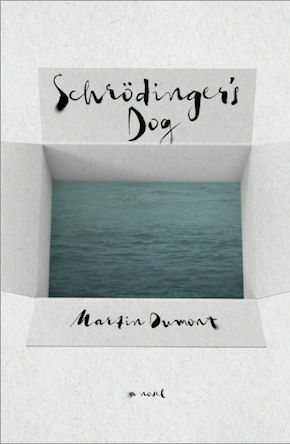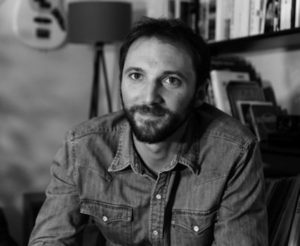A good lie
by Martin Dumont
“This rich, somber debut offers powerful philosophical insight into questions of what people owe one another and the value of subjective belief.” Publishers Weekly
“Excuse me?”
Her voice unnerved me a little. It also scared me. First I heard the surprise in it, and then the touch of indignation. I disregarded her tone. She shouldn’t see the flaws. My fright, for example, and my inner doubts. If she noticed those, there was no chance.
I explained again, as clearly as possible. I wanted her to play an editor. Employed by a publishing house, and in charge of the manuscript submitted by one Pierre Marès. It wasn’t so complicated. She had to meet with my son once or twice. Make him understand that things were moving along. The same thing she usually did, in other words. After all, that was her profession, wasn’t it? Nothing to it. Everything the same, except make-believe.
She made a face. I said I understood the difficulty, but I didn’t know anyone else. And besides, she’d be paid well. Yes, that wouldn’t be a problem. I was ready to cough up whatever it took.
She adjusted her glasses. She was shaking all over. Mute anger. Understandable enough – I was backing her into a corner.
“I… I can’t.”
I calmly asked her why not. She said she couldn’t condone my plan. I sensed that she wanted to say more, but she held back. I said that wasn’t a problem. She said yes it was. I said no it wasn’t, leaning in. It was kind of ridiculous.
A heavy silence set in. We were playing this game at her place, and I couldn’t take it anymore. I was worried, but not without resources. I hadn’t tried actors yet. I could always find one who was out of work and ready to take on the role.
“What you’re asking… it doesn’t make any sense. The book doesn’t exist… and besides, I’m only an editorial assistant. How do you expect me to—”
“Do you really think that’s important?”
She didn’t take me up on that. I could see the fear in her eyes, so I pressed harder.
“Who gives a damn about that? You know this profession, you’re in the best position to play the part. I’m not asking you to agree with me. I’m asking you to help me.”
“You’re asking me to lie.”
I shook my head. “I’m asking you to tell him what he wants to hear.”
My skull ached. I didn’t like the turn things were taking. There was no need for me to justify myself, not to her. I didn’t give a damn about what she might think. I felt like getting up, telling her to go fuck herself, heading for the government employment center, and hiring a temporary worker. But I didn’t dare. I decided I couldn’t trust actors, they’d take too many liberties with the role. And besides, if an actor was out of work, that meant he or she wasn’t any good.
I murmured, “Don’t worry. In any case, it won’t last very long. He’s in the terminal stage.”
That time it was horror that I saw pass over her face. She averted her eyes and capitulated.
She made it clear that she didn’t want anything. No instructions, no explanations, and especially no money. She told me she’d visit him only once, and even that was going too far. She would be alone, she said, on a day of her choosing. And I must never call her again.
I replied that one time wasn’t much.
“Take it or leave it.”
I agreed.
It took her four days to decide to visit Pierre. I went to see him at the hospital every morning. When I told him an editor was going to drop in, he thanked me. That struck me as odd. Thanks. For what? I nearly asked him the question.
The four days were long. Pierre wanted her telephone number; he said he didn’t have very much time. He repeated that, and I felt something like a fire in my chest. In the end, I got upset. I told him he had to chill out. I said he had enough time, she was going to come, I hadn’t raised a capricious son. I yelled, and that calmed him down.
All the while, I acted like a guy sure of himself. I tried to soothe him, but deep down inside, I was scared to death. I hesitated to call her. I was starting to really get worried, but she finally kept her word.
He talked about his book, and I believed in it too. That book existed. At that moment, in that room, between ourselves. It wasn’t his dream anymore, or my lie.”
It was the fifth day. When I stepped into the room, Pierre greeted me with a smile I didn’t think possible anymore. He was so beautiful, there on the bed, with joy splitting his face. It came down on me like a ton of bricks and almost made me lose my balance. The bright white of the walls turned dull. Or rather, he had become so luminous that he outshone everything else. My son. He wouldn’t stop talking. He was like an insane person. “A book.” He kept repeating those two words. “Can you imagine, Dad? They’re going to make it into a book! I’ll have my name on it. Like this, under the title: Pierre Marès. Unless I use a pseudonym… But no. Pierre Marès, that’ll be perfect. And that’s not all: I’m going to dedicate it to you! For my father. Or To my father. What do you think? Which do you prefer? It’s up to you!”
He kept talking nonstop, and I could barely see him. I was floating, I swear I was floating, we were both floating. There was no more bed, no more cancer, no more plastic tube. He talked about his book, and I believed in it too. That book existed. At that moment, in that room, between ourselves. It wasn’t his dream anymore, or my lie. It was a book. Like he’d said. With “Pierre Marès” under the title. And a dedication inside.
I don’t remember the rest. I left when they came in to get him ready for the night. I was groggy, dazed with happiness. I barely heard the nurses. Someone put a hand on my shoulder, gently. I kissed Pierre. He was laughing, I’ve forgotten why. I went out backward, so I could enjoy the sight of him as long as possible. When I crossed the threshold, he called out, “See you tomorrow.” I went down the corridor. As I got in the elevator, I was still laughing. I saw an orderly approaching, so I blocked the door with my foot. He was going to the ground floor too. I pressed the button. He gave me a sidelong look, and I could sense that he was uncomfortable. I was still laughing, I couldn’t manage to stop. I told him that I was sorry, that I understood his discomfort. It wasn’t polite to giggle like that in a hospital. He frowned. He asked me if everything was all right. I asked him why, and he placed a hand on my arm.
“You’re crying.”
Excerpted from Schrödinger’s Dog (Other Press, $14.99/£.12.99)
 Martin Dumont was born in Paris in 1988 and spent many years in Brittany, where he fell in love with the sea. In addition to writing, he works as a naval architect. Schrödinger’s Dog, his first novel, is translated by John Cullen and published by Other Press in paperback and eBook.
Martin Dumont was born in Paris in 1988 and spent many years in Brittany, where he fell in love with the sea. In addition to writing, he works as a naval architect. Schrödinger’s Dog, his first novel, is translated by John Cullen and published by Other Press in paperback and eBook.
Read more
Buy from amazon.co.uk
@Mart_Dumont
@otherpress
Author portrait © Aliosha Padovani
John Cullen is the translator of many books from Spanish, French, German and Italian, including Susanna Tamaro’s Follow Your Heart, Philippe Claudel’s Brodeck, Carla Guelfenbein’s In the Distance with You, Juli Zeh’s Empty Hearts, Patrick Modiano’s Villa Triste, and Kamel Daoud’s The Meursault Investigation. He lives in upstate New York.

